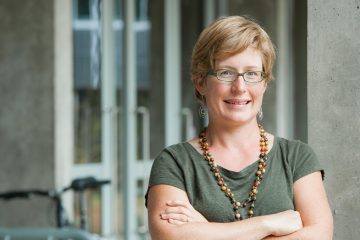Sustainability Education Awards Recognize UBC
Two collaborative UBC papers were recognized as high-impact sustainability projects and pioneering research. Both thought-leadership papers received 2021 Sustainability Awards given by the Association for the Advancement of Sustainability in Higher Education (AASHE).

Hannah Wittman
Winning in the Engagement category for its position on how to strengthen links between public research institutions and grassroots seed movements to build a more resilient seed and food systems was a paper written by Hannah Wittman, Alexandra Lyon and Harriet Friedmann.
“We recognized the historically powerful role of public universities in both suppressing and commodifying diverse ways of knowing related to resilient and diverse farming systems in North America,” says Wittman, professor in UBC’s Faculty of Land and Food Systems and UBC Farm’s Centre for Sustainable Food Systems (CSFS).
“We also identified important responsibilities and opportunities for community-university collaboration in restoring and repairing these knowledge systems for social and ecological sustainability.”
The paper, published in Elementa: Science of the Anthropocene, examined the history of public research for seed systems in North America using a “seed regimes” framework. Since the mid 20th century, public agricultural research has increasingly focused on the privatization of knowledge, exacerbating inequalities among farming communities, and contributing to ecological degradation. The authors ask: Can public universities play a role in fostering seed sovereignty?, and demonstrated how community organizations are leading seed sovereignty organizing and freelance plant breeding projects to democratize seed research and knowledge, in some cases by strengthening links between public research universities and grassroots seed movements.
Professor Wittman wrote the paper with Alexandra Lyon, a former CSFS postdoctoral fellow who worked with Dr. Wittman and is a current faculty member at Kwantlen Polytechnic University, and Harriet Friedmann, a professor emeritus of Sociology, University of Toronto, who participated in the project as an International Visiting Research Scholar affiliated with the UBC Peter Wall Institute for Advanced Studies.
Another paper that recognizes addressing social inequities as being foundational to transforming food systems won first place in the Operations category.

Will Valley
The paper, titled Towards an equity competency model for sustainable food systems education programs, reviewed 108 sustainable food systems education (SFSE) programs in North America to evaluate whether the curriculum helped increase students’ equity-related capabilities. The researchers found that roughly 80% of universities with SFSE programs do not provide evidence that they explicitly include equity in their curricula. As a next step, they proposed an equity competency model, based on literature from multiple fields and perspectives, being incorporated.
“It is an honour to have our efforts recognized by AASHE. Much work lies ahead in dismantling systems of oppression within and beyond food systems,” said Will Valley, Associate Professor of Teaching and Associate Dean, Equity, Diversity and Inclusion in UBC’s Faculty of Land and Food Systems.
“Receiving this award will help amplify the core findings of our article and extend the conversation around building an equity competency in SFSE programs, and hopefully to STEM and health-related disciplines more broadly.”
The paper was also published in Elementa: Science of the Anthropocene and was a collaboration by Valley; Colin Dring, PhD candidate in LFS; Molly Anderson, Middlebury College; Nicole Tichenor Blackstone, Tufts University; Eleanor Sterling and Erin Bentley, American Museum of Natural History; Sharon Akabas and Pamela Koch, Columbia University; and Joanne Burke and Karen Spiller, University of New Hampshire.
The awards recognize individuals and higher education institutions that are inspiring continued progress toward environmental, social and economic health.
AASHE empowers higher education administrators, faculty, staff and students to be effective change agents and drivers of sustainability innovation. AASHE enables members to translate information into action through resources and professional development.